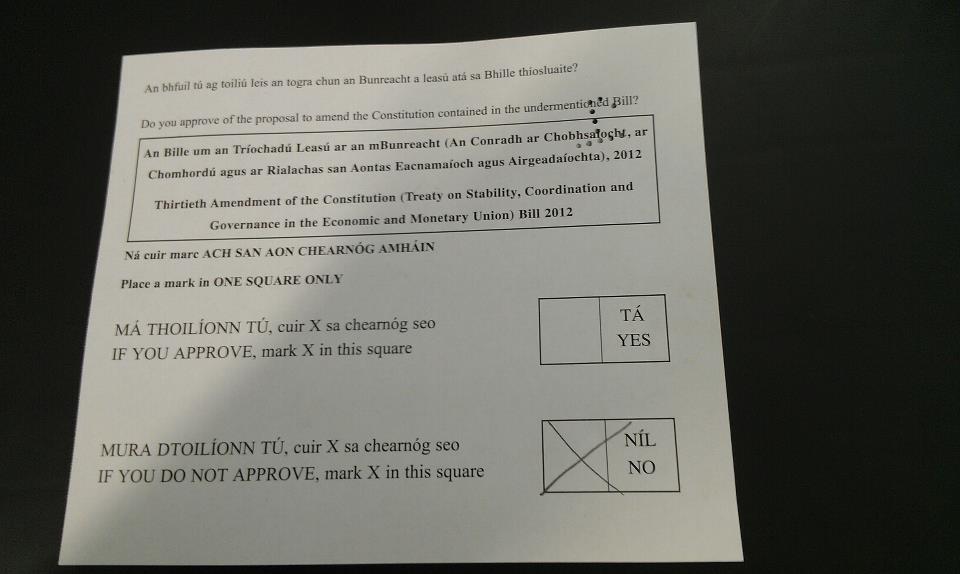On why I voted no

When I went to the voting booth yesterday, I voted No.
It was not a case of last minute gitters, nor was it a case of my being terrified by the austerity threats of the no-campaigners; I just didn’t have it in me to vote yes.
This was the first time I’ve ever voted against a European referendum, and I did it because I have lost my faith in the institutions of the European Union.
On a whole the European Community has been a wonderful thing. Europe (if we ignore our collective culpability in the atrocities of the Balkans) has been at peace for longer than at any other period in history.
The results aren’t in but my sense is that there will be a marginal victory for the yes side. I didn’t campaign for a no vote, though mostly because I found those on that side of the debate to be too unsavoury, or too ideologically removed from me, or both.
My reasons for voting no emerge from a technical point within the treaty, which illuminates my wider difficulties with the institutions of Europe.
Article 3, section 1, subsection b states:
if the annual structural balance of the general government is at its country-specific medium0term objective as defines in the revised Stability and Growth Pact with a lower limit of a structural deficit of 0.5% of the gross domestic product at market prices. The Contracting Parties shall ensure rapid convergence towards their respective medium term objective. The timeframe for such convergence will be proposed by the Commission taking into consideration country-specific sustainability risks…
So a consequence of this is that the commission would have a hand in guiding the budgets of the European countries. I am not against hard fiscal rules, though over forty years of experience in the United States has shown that they have no great net effect on the financial health of states.
My difficulty is that the Commission will decide, on a state by state basis, what budgetary conditions the state should operate under. This obviously confers a lot of power upon the Commission. The question I have is whether we can trust the Commission.
The treaty asks us to play a game where the goal posts have yet to be set and where, when they are set , they can be moved. This is not an idle consideration. The initial Stability and Growth Pact failed under the weight of the French and the German economies. When it became obvious that the French and the Germans could not operate within the strictures of the Stability and Growth Pact, the Commission amended their reading of the Pact such that “investment” spending such as infrastructural payments by the state, spending on education etc. did not fall within the terms of government spending; hence the French and the Germans were never technically in breach of the Pact.
This sorely undermined the Commission. When later it began to rightly argue that the Irish economy was overheating, the response from Merrion Street was that the Germans couldn’t live up to their own rules on spending, but regardless they were comfortable lecturing us on our spending.
The Commission has form when it comes erring in favour of the bigger European states while it is interpreting its responsibilities, and thus it has lost my trust.
I think that the European project has been a wonderful thing, though not universally so. The peace dividend which we have reaped, the defence of the rights of man, the trade and educational benefits have been marvellous. But I have come to the opinion that there was hubris among those who drafted the Maastricht treaty and beyond. The desire of the authors of the later treaties was to leave their fingerprints indelibly on history. They hustled the European Community into the European Union, I believe, with too much haste and without finesse. The institutions of Europe had become more important to these men, than the effects of these institutions on the citizens of Europe. The integration of the institutions outpaced the integration of the peoples of Europe, and by a long distance the integration of the economies of Europe.
And we bear the fruit of this poisoned tree. The ambition of those who wanted to be the authors of a European Constitution, have squandered the common wealth of those of us who will have to pick our way among the detritus of their decisions


